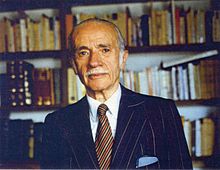Alfredo Pareja Diezcanseco
| Alfredo Pareja Diezcanseco | |
|---|---|

Pareja in 1990
|
|
| Born |
October 12, 1908 Guayaquil, Ecuador |
| Died | May 1, 1993 (aged 84) Quito, Ecuador |
| Occupation | Novelist, Essayist, Journalist, Historian, Diplomat |
| Nationality | Ecuadorian |
| Genre | Fiction, Non-Fiction |
Alfredo Pareja Diezcanseco (October 12, 1908 in Guayaquil — May 1, 1993 in Quito) — born Alfredo Pareja y Díez Canseco — was a prominent Ecuadorian novelist, essayist, journalist, historian and diplomat. An innovator of the 20th-century Latin American novel, he was a founding member of the literary Grupo de Guayaquil ("Group of Guayaquil"). The government of President Jaime Roldós Aguilera (1979–81) appointed him Chancellor of the Republic and he served as Foreign Minister of Ecuador (1979–80) and Ambassador to France (1983–84).
Pareja was born in Guayaquil in 1908, the son of Fernando Pareja y Pareja (1862-1919) and of Amalia Diez-Canseco y Coloma (1865–1945), daughter of the former Peruvian President Francisco Diez Canseco y Corbacho. He had to support his family from the age of 14, reading at night and assisting as a listener at the Colegio Vicente Rocafuerte. His early education was accomplished in his hometown: primary school at the Colegio San Luis Gonzaga of the Christian Brothers.
In 1930, Pareja embarked on a footloose adventure in the United States. As a result of the Great Depression he worked on the New York City docks for a year (his later novel El Muelle reflects these experiences). Back in Ecuador, he became a professor of history and of Spanish and Spanish American literature at Universidad Laica Vicente Rocafuerte de Guayaquil. He also served as a Superintendent of Secondary Education and as a Deputy of Guayas Province. In 1934 he married his cousin, Mercedes Cucalón Concha niece of Carlos Concha Torres with whom he had three children, Cecilia, Jorge and Francisco.
...
Wikipedia
